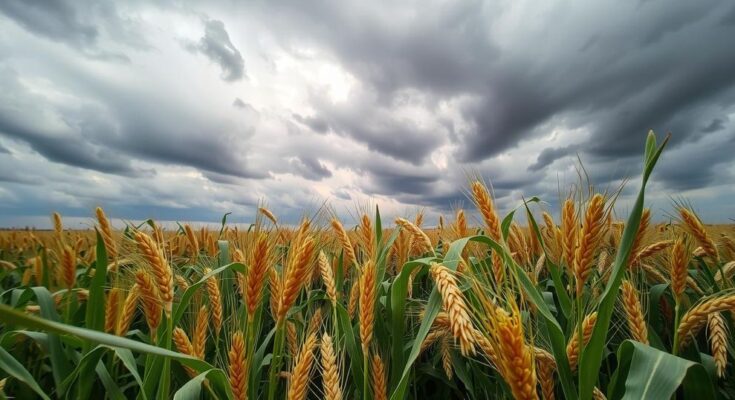A study reveals that climate change may threaten up to a third of global food production, with particularly severe impacts in low-latitude regions. Essential crops face reduced growing areas, potentially diminishing food security. Adaptation and mitigation strategies are crucial to address these challenges, given the globalized nature of food systems.
Recent research published in Nature Food reveals that climate change could threaten up to one-third of global food production. Conducted by researchers from Aalto University, the study assesses how temperature, precipitation, and aridity changes affect the viability of 30 primary food crops worldwide. With rising temperatures, essential crops such as rice, maize, wheat, potato, and soybean—accounting for over two-thirds of global food energy—face severe reductions in suitable land.
Low-latitude regions are predicted to experience significantly greater detrimental effects compared to mid- or high-latitude areas. Under various warming scenarios, up to half of the crop production in these vulnerable regions may be jeopardized, resulting in reduced crop diversity. Doctoral researcher Sara Heikonen emphasized that diminishing crop variety would compromise food security, making it increasingly challenging to obtain sufficient calories and protein.
Specific crops, especially tropical root crops like yam, are identified as particularly susceptible, especially in low-income regions. In sub-Saharan Africa, nearly three-quarters of current crop production may be at risk if global temperatures rise beyond 3°C. Conversely, mid- and high-latitude regions are expected to maintain agricultural productivity and could even increase crop diversity, with new varieties emerging in northern climates.
However, as noted by senior author Matti Kummu, even favorable climate conditions might introduce new pests and extreme weather, complicating agricultural stability. Heikonen highlighted that securing the food system requires both climate change mitigation and adaptation strategies. Despite the larger impacts anticipated in equatorial areas, the interconnected global food system means that all will feel the repercussions.
In conclusion, the implications of climate change on food crop production are profound, with low-latitude regions facing the most severe threats. A significant portion of essential food crops are at risk, which could lead to decreased food security and greater challenges in nutrition. To safeguard future food systems, it is imperative that coherent mitigation and adaptation strategies are implemented globally, as the repercussions of climate change extend beyond regional boundaries.
Original Source: www.aa.com.tr




